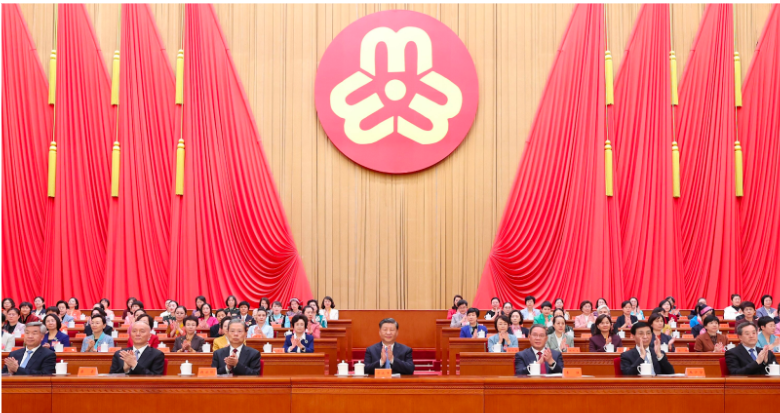Changes in Rhetoric to China's Women's Congress Push Patriarchal Values
The 13th National Women’s Congress was held in Beijing and dominated by men (Photo: NYT/Yao Dawei/Xinhua)
A patriarchal agenda dominated China’s 13th National Women’s Congress this year. The Congress, held every five years, has largely symbolized the Chinese Communist Party’s dedication to gender equality and women’s rights. Despite the party leaders being all male, the Congress has historically championed self-realization and equality for genders. However, amid an economic and demographic crisis this year, party leaders used this Women’s Congress to push back on those progressive ideals in favor of more traditional gender roles.
The phrase “Equality between men and women is a fundamental national policy of the Chinese government” has been a fixture in party leaders’ addresses to the Women’s Congress since 1995, but was omitted from any speech this year. Instead, the speeches opted for directing women to “study and implement Xi Jinping Thought on Culture,” which celebrates traditional family virtues, and to “establish a correct outlook on marriage and love, childbirth and family.” These are among a few of the simple language shifts that altered how this Congress was conducted and the message it sent out to the nation.
Since taking power in 2013, Chinese President Xi Jinping has been aiming to implement a more traditional view of gender and family throughout China. During this time, the government has suppressed the #MeToo movement, overhauled a 30-year-old law that eliminated discrimination against women and tackled sexual harassment, and, most recently, excluded women from decision-making in the Communist Party’s Politburo, where Jinping was elected for an unprecedented third term.
However, the Women’s Congress does not actually represent the fight for women’s equality in China, despite the party wanting people to think so. Conversely, it has always represented the status quo and is just an instrument for the Party. This pro-natalist and traditionalist vision of gender relations conflicts with the youth sentiment that is largely against marriage and childbirth. Additionally, women have become increasingly more empowered in China, united against both the heavily patriarchal society and an authoritarian government. However, this unity and empowerment is considered a stubborn rise of feminism, and has been met with strong pushback.
Women at the National Women’s Congress (Photo: Prensa Latina)
The current economic and demographic climate in China has created the perfect opportunity for backpedaling on gender equality. China’s birth rate has fallen extensively over the past years, and the population has shrunk for the first time in decades. With this, there is a rise in elderly to care for compared to youth, which strains welfare programs. All of this is taking place in a country with a stalling economy and high unemployment. In these conditions, sending women back into the home to have children and take care of the elderly can be seen as a political move. It is no longer in the Party’s interest to support gender equality, and instead, gender traditionalism is more helpful.
The Women’s Congress held in Beijing is a step in Xi Jinping and the Communist Party’s path toward gender traditionalism. Pro-natalist and family virtues are seen as both patriotic and helpful to the economic and demographic issues in China today. And, as the Party has managed to impose restrictions on women, family, and bodily autonomy before through their One Child policy, it is not so farfetched to imagine they can do it again.


